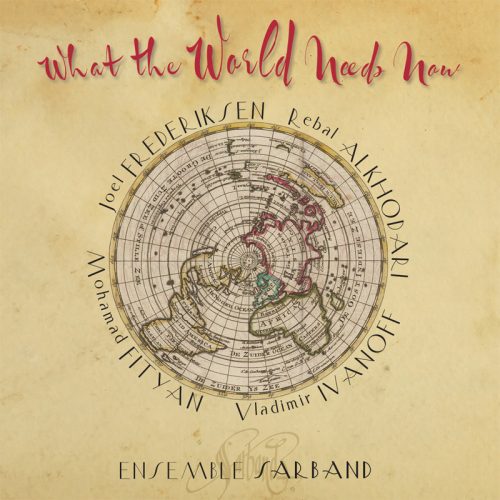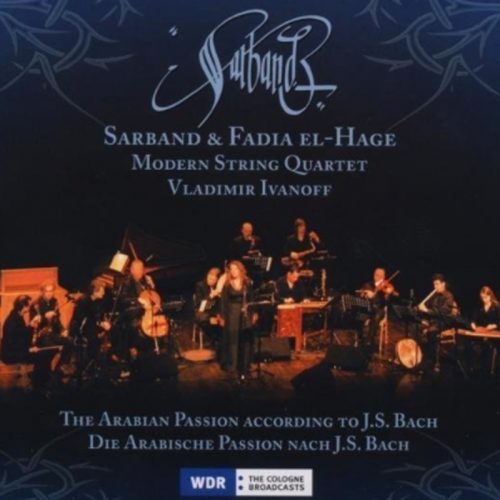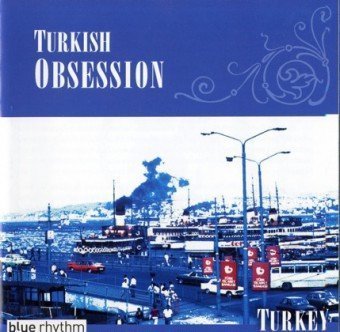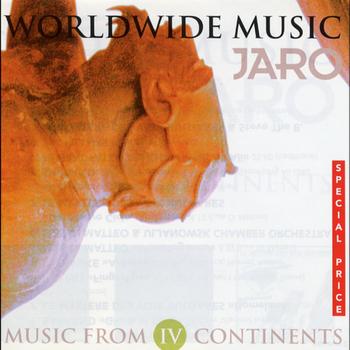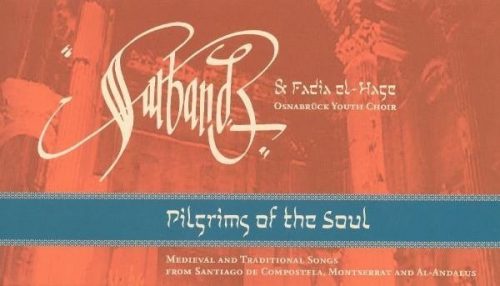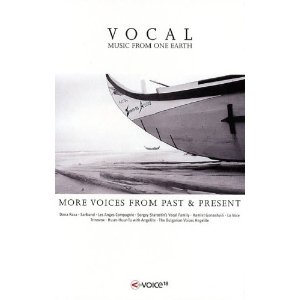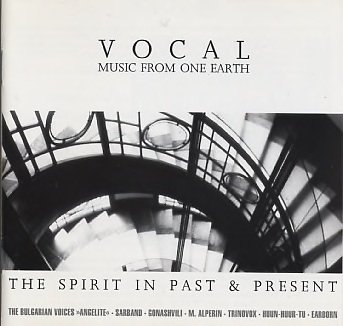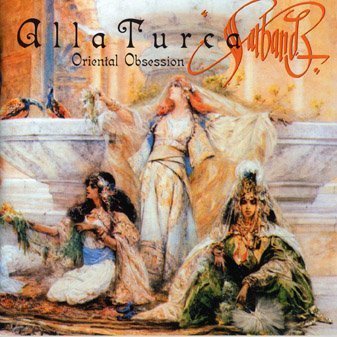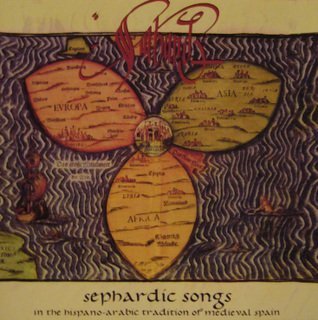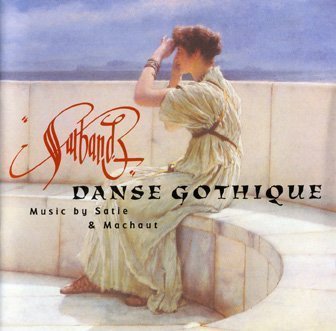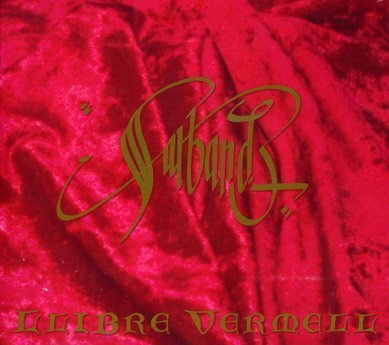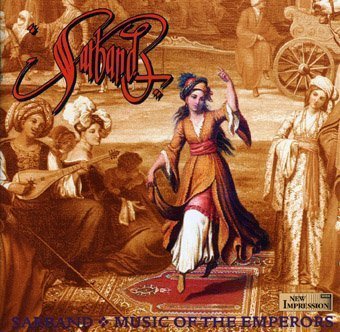Sarband is an unique ensemble, assimilating the stimuli of different musical cultures into its performances. The repertoire encompasses not only medieval music from the Orient and Occident, but also staged productions of Baroque and contemporary music.
Sarband was founded in March 1986 by musicologist and musician Dr. Vladimir Ivanoff, mainly with the goal of demonstrating the relationships between European early music and the musical cultures of Islam, as well as their considerable consequence for contemporary music. The name of the band is derived from a Persian and Arabic word designating the improvised transition between two parts of a suite. Sarband is an international project with artists from Iran, Germany, Italy, France, Bulgaria, Hungary, Turkey, Lebanon, Iran, and the USA.
On October, 26th, 2003, Sarband was awarded the ‘Classic Echo’ for the production “Dream of the Orient” together with Concerto Köln ensemble. Alongside that, Sarband’s list of honors includes: Grammy Nomination “Traditional Music” (1992) , Echo Klassik (2006) and German World Music Award 2008. Since 2011, Sarband started featuring its own annual festival – “Tonfolgen”, Bonn, Germany.
Style
The main stylistic concept of Sarband resides in connecting cultures, people and epochs. Its programs mediate between past and present, Early Music and living traditions, thus, uniting European Middle Ages, ancient music, folklore, non-Western classical music, Christian and Islamic mysticism, Sufi music, and Jazz. The cooperation in the ensemble is not a fashionable crossover, but conceived as a continuous dialogue on equal terms. All the artists unrestrictedly contribute their native traditions, their personal histories and their own creativity to the programs, so that Sarband also becomes a musical training ground for communication and tolerance between different cultural identities. This can be also confirmed by the numerous reviews. For instance, Frank Heindl, DAZ Magazine wrote: “Sarband’s music speaks for itself– their message of intercultural understanding does not need any explanations”. To conclude, as Alain Maestracci, Nice Matin Magazine (France), once referred to Sarband, the ensemble is: “an immense ode to peace”.
Performance
Sarband’s unique profile as an ensemble, combining historical performance with non-Western practices, has led to the development of innovative formats for its concerts. In this sense, it is not accidental that the Early Music America Magazine wrote in a review that: “The sensuous voice of Lebanese singer Fadia el-Hage was mesmerizing in songs laced with passion, bawdy humor, and a touch of melancholy. The instrumentalists were outstanding, playing a variety of exotic instruments, serving up a rich feast of music that appeals directly to the senses.”.
In recent years, Sarband has performed in numerous international festivals, for widely differing audiences, from Early Music to Rock and Jazz. These include: ‘Horizonte-Festival’ in the context of the “Berliner Festspiele” (Germany), ‘Settimana Internationale’ in Enrice (Italy), ‘Szene-Festival’ in Salzburg (Austria), ‘Istanbul-Festival’ in Istanbul (Turkey), ‘Settimane Internazional’ in Siena (Italy), ‘Romanischer Sommer’ in Cologne (Germany), ‘Internationale Funkausstellung’ in Berlin (Germany), ‘SFINKS-World Music’ in Antwerpen (Netherlands), ‘Kampnagel-Sommertheater’ in Hamburg (Germany), and ‘GREC-Festival’ in Barcelona (Spain).
Musical Pleas for Peace

– Passio-Compassio: Sarband have specialized in challenging history and narratives from unusual points of view and in illuminating connections that are obvious only to the “third ear”. With his Arab, Turkish and German musicians, Whirling Dervishes, jazz saxophonists and a jazz string quartet, Vladimir Ivanoff invites on a meditative journey through space and time, through religions and cultures, into a spiritual space of mutual awareness beyond personal, denominational or religious borders. These musical embodiments of Passio and Compassio are framed by the ritual of the Muslim Mevlevi dervishes, which symbolizes human salvation by way of loving union with the Creator, comparable to Christian notions of unio mystica.
 – Sacred Bridges: Jews, Christians and Muslims sing and listen to the same songs of lament and joy, confessions of sin, songs of praise and glory. In this joint program, Psalm settings by composers from three cultures and religions, but the same epoch, build bridges crossing today’s ruptures. Psalms serve as a source of spirituality, a political instrument, a link between tradition and present, but most of all as a path leading humans together. Sarband intertwined the compositions of Salamone Rossi, Claude Goudimel, J. P. Sweelinck and Alî Ufkî in order to recapture the original intention of the psalms: to be sacred bridges between peoples, religions, between human beings.
– Sacred Bridges: Jews, Christians and Muslims sing and listen to the same songs of lament and joy, confessions of sin, songs of praise and glory. In this joint program, Psalm settings by composers from three cultures and religions, but the same epoch, build bridges crossing today’s ruptures. Psalms serve as a source of spirituality, a political instrument, a link between tradition and present, but most of all as a path leading humans together. Sarband intertwined the compositions of Salamone Rossi, Claude Goudimel, J. P. Sweelinck and Alî Ufkî in order to recapture the original intention of the psalms: to be sacred bridges between peoples, religions, between human beings.Of Women and Men
– Vox Feminae: In this program we pursue the female paths towards the cognition of God in early and traditional sacred music from Orient and Occident: songs from the Early Christian Oriental repertoire, chorales by Hildegard of Bingen and Brigitta of Sweden, sacred songs from rural Sweden, early polyphony from the Spanish Codex Las Huelgas. “Ensemble Sarband demonstrated impressively, how beautiful music from times gone by can be… Under the title “Vox Feminae”, the wonderful voices of Miriam Andersén and Fadia el-Hage sounded in the church … a concert, which many will remember for a long time, as the applause made very obvious.” Weser-Kurier

Roots into the Future
– Our Father Abraham: Ensemble Sarband sings about the history of Abraham’s family, which still contains fuel for political conflict as well as the seed of a new community of religions. Songs for the pilgrimage to Mecca and Sephardic-Jewish ballads, Qur’an recitation and Early Christian Aramaic hymns flow into a musical ritual, a celebration of the Father of a Multitude. Religious history and very human stories, sung in a spiritual atmosphere beyond inter-religious dispute.
– Cultures of Tolerance: Ensemble Sarband’s musical odyssey around the Mediterranean and across eight centuries of music history is meant neither to prove the mutual influence nor the insurmountable differences: it paints a musical picture of the everyday life that Jews shared with Christians and Muslims in Al-Andalus, the Ottoman Empire and the European Diaspora. Sephardic songs are placed beside Muslim Sufi hymns composed by a Christian convert; the Cantigas de Santa Maria, collected by King Alfonso el Sabio in the 13th century, and Catholic polyphony from the royal Spanish nunnery of Las Huelgas de Burgos are performed together with Ottoman-Turkish court music written by Jewish composers.

– Alî Ufkî / Wojciech Bobowski. Lord of the Horizons, Collector of Musical Worlds: The Ottoman Sultans saw themselves as the “Lords of the Horizons”, in whose realm the sun did not set. Wojciech Bobowski / Alî Ufkî became the true lord of the cultural horizons, having mastered more than a dozen languages as well as both Turkish and European music and moving between two of the world religions. His universal erudition and creativity are incomprehensible today; he was born a Pole and died after a long and uniquely prolific life as a citizen of the world and a collector of worlds. The 17th century, time of the great religious wars, led him to a commitment to faith, which did not rest on one religion, one culture only.
 – Hortus conclusus – The Closed Gardens of Paradise: European and Persian-Ottoman music about gardens closed, mysterious and freshly in bloom, accompanied by projections of illustrations from the medieval Orient and Occident, tell how in the closed garden of paradise the “spiritual” and “worldly” spheres unite in a universal mysticism of love. “On the eroticism of faith. Vladimir Ivanoff and his Ensemble Sarband enchanted with treasures of the medieval Orient and Occident at the Graz Easter festival. Vladimir Ivanoff is a sophisticated cartographer of the exceptional. Delightful array of voices … The projected texts, displayed onto images of Gregorian notation, miniatures from the Bible or Oriental carpets, were a work of art in their own right. In a nutshell: seamless enjoyment.” Kleine Zeitung
– Hortus conclusus – The Closed Gardens of Paradise: European and Persian-Ottoman music about gardens closed, mysterious and freshly in bloom, accompanied by projections of illustrations from the medieval Orient and Occident, tell how in the closed garden of paradise the “spiritual” and “worldly” spheres unite in a universal mysticism of love. “On the eroticism of faith. Vladimir Ivanoff and his Ensemble Sarband enchanted with treasures of the medieval Orient and Occident at the Graz Easter festival. Vladimir Ivanoff is a sophisticated cartographer of the exceptional. Delightful array of voices … The projected texts, displayed onto images of Gregorian notation, miniatures from the Bible or Oriental carpets, were a work of art in their own right. In a nutshell: seamless enjoyment.” Kleine Zeitung– Odin’s Daughter: Ensemble Sarband combines an adventurous but true 17th-century story from Iceland and the Ottoman Empire with classical Ottoman and traditional Scandinavian music, accompanied by projections of text and images.”With instruments such as Gothic harp, cow horn, hand drum, the wind instrument Ney, the violin-like Kemenge and the Asian zither Kanun the artists created a unique atmosphere, in which not only the diverse musical cultures intertwined harmoniously, but, in the general context of the suspense-packed framework plot, a bridge of reconciliation was built.” Nordbayerischer Kurier
Alla Turca
-Vienna 1683: An acoustic battle painting from and about Vienna 1683, one of the decisive turning points in European and Turkish history. Thunder of cannons and clarion calls, drumbeats, war songs and laments are certainly more entertaining in hindsight than during the actual event. But this military encounter is also the site for the first, cautious cultural approaches of modernity between Orient and Occident, which in later times merged into enchanting “alla turca” operas and melancholy Turkish waltzes.

– Music for Emperors and Sultans: Music as a display of power is certainly on of the most successful means of political representation. First and foremost, European rulers were inspired by the old Oriental ceremonials, but Eastern rulers also increasingly oriented themselves by European courts. Consequently, a continuous and fruitful cultural exchange ensued. Sarband designed this program for a joint concert with the Bremen Philharmonics under the direction of Markus Poschner. Together with him, Sarband have performed this program with many new orchestras, last with the Dresden Philharmonics.
– The Waltz: Identifying an almost-forgotten phenomenon of cultural exchange, “The Waltz” juxtaposes early German waltzes by Beethoven, Lanner and Johann Strauss I with original Turkish waltz compositions from the same era. Just as Mozart and his generation were impressed and inspired by Ottoman culture and music, there was also a time when the sultans of the Ottoman world fell in love with Western culture, and especially with its dances – which resulted in Turkish adaptations of the waltz and dervishes dancing to waltzes at the Sultan’s courts.
Oriental Obsessions
– Sheherazade in Paris: Vladimir Ivanoff and Sarband tell the story of a fascinating approach and find Europe in Turkey and the Orient in Paris. “Closeness and distance were the two poles of this enchanting evening […] With her colorfully shaded soprano, Dilek Geçer lent great intesity to Callisto Guatelli Pasha’s song settings. In the second half, the audience was plain enthralled by this erotically charged singing. Celalettin Biçer on ney and kanun, Ahmed Kadri Rizeli (kemençe) and Ugur Isik (violoncello) created magical moments in their joint improvisations.” fg, Main Post
– Journeys to Unreachable Places: “Part of the audience… lost themselves in the exotic music, while others marvelled at this insight into an unfamiliar religious world. […] the applause lasted several minutes.” Mainpost

– Son of the Sheik: In 1926, Hollywood captured its dream of the bold and passionate “Oriental” in the movie “Son of the Sheik” with the legendary Rudolph Valentino in the leading role and thus nourished modern orientalism of Anglo-American character. Sarband complement, question, comment and cast irony on the Western image of the Orient with the sound of traditional Middle Eastern music, confronting Hollywood’s imaginary Orient with the reality of oriental music. Sarband’s music confronts the “Son of the Sheik”, this ingenious product of western exotist fantasy, with its actual object.
Exciting Soundscapes, Words and Music
– In the Realm of the Golden Apple: “[…] one of the most fascinating programs at the “styriarte” festival: humorous, entertaining, with exciting content.” Kronenzeitung

– Passions: the deepest suffering, there is passion; true passion embodies suffering. Sarband explore this eternal truth of Christian thought, derived from the Passion of Christ and the martyrdom of the Saints, on a journey through the poetry, imagery and music of the era that generated its attitude towards life in it: the 15th century.
For more information please visit: Sarband Programs.
Vladimir Ivanoff– artistic director, percussion, lutes

As a CD producer, composer and arranger, he works with numerous artists from widely diverse backgrounds, amongst them: Mystère des Voix Bulgares, Megapolis, Concerto Köln, The King’s Singers, Berlin Philharmonic Orchestra, RIAS Chamber Choir, and Sidi Larbi Cherkaoui. Ivanoff was nominated for two Grammy Awards in 1994. With Sarband, he received two Echo-Klassik CD Awards in 2003 and 2006. The Region of Apulia awarded him with the “Premio Mousiké” for the diffusion of Early Music in the Mediterranean in 2007.
The following year he received the German World Music Award for his work with Sarband. As an ensemble director, musician and scholar, Ivanoff endeavors to mediate between the theory and practice of music. He illuminates the connecting threads between Orient and Occident, Judaism, Christianity and Islam, past cultures and present time. By doing this, he is not interested in creating hip cross-cultural mishmash projects. Instead, he is driven to create a deeper public consciousness for cultural distinctions, for clichés, for the patterns, which determine our perception of the Other and the Foreign.
Fadia El-Hage– voice

Since 1990 she has performed as a soloist in Ensemble Sarband, Vox and L’Orient Imaginaire, specializing in Medieval and Mediterranean song. In 1994 she returned to Lebanon, where, since her breakthrough concert at the 1998 Festival of Baalbeck, she is considered one of the Arab world’s major singers.
Dilek Geçer– voice
Giuseppe Paolo Cecere– voice, viella, lira da braccio, hurdy gurdy
Mustafa Dogan Dikmen– voice, ney, percussion
Miriam Andersén– voice, gothic harp, cowhorn
Fabio Accurso– lutes, flutes, reeds, percussion
Susanne Ansor– vielle, rebec
Celaleddin Biçer– ney, kanun
Ya Dong– pipa
Ian Harrison– cornett, shawm, bagpipes, voice, fiddle
Mohammed Ali A. Hashim– violin, viola
Ugur Isik– ajakli keman, cello
Angelika Moths– harpsichord, organ, qanun
Furat Qadduori– qanun
Safinaz Rizeli– kanun
Ahmet Kadri Rizeli– kemençe, percussion, voice
Charbel Rouhana– oud, voice
Adnan Schanan– nay, oud, voice
Bahadir Sener– kanun, percussion
Jean Walther– santur, percussion, shawm, bagpipes, nay, viella
Fengxia Xu– guzheng, sangxian
Zhenfang Zhang– erhu
